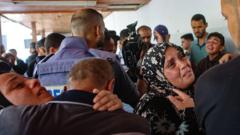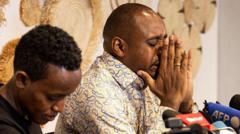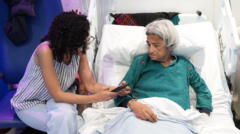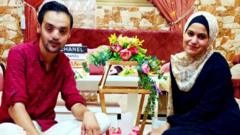In a tense political climate, the DR Congo's government has prohibited media from reporting on former President Joseph Kabila, amidst allegations of treason and connections to rebel groups.
**Media Blackout: DR Congo Prohibits Coverage of Former President Kabila**

**Media Blackout: DR Congo Prohibits Coverage of Former President Kabila**
The Congolese government imposes a media ban following Joseph Kabila's return amid political unrest.
The Democratic Republic of Congo (DRC) has enacted a media ban restricting coverage of former President Joseph Kabila, just weeks after his return to the country. This decision comes during a politically charged environment, following accusations against Kabila of treason and alleged ties with M23 rebels, claims he has categorically denied.
The media restriction was introduced by the Supreme Council of Audiovisual and Communication (CSAC), led by Christian Bosembe, who announced that any violations could lead to suspension of broadcasting rights. Kabila’s recent presence in the eastern city of Goma, currently under M23 control, has heightened tensions, particularly as the Senate has lifted his immunity, opening the door to potential legal action against him.
An M23 spokesperson has confirmed that media outlets operating in their territories will defy this ban, indicating possible resistance against the government's order. Kabila’s party secretary, Ferdinand Kambere, criticized the ban as an “arbitrary” measure on the platform X, arguing it only serves to suppress free expression.
Kabila, who has recently re-emerged into the political scene, described the current government as a “dictatorship” in a speech last month, prompting a rebuttal from government representatives, asserting that Kabila offers nothing constructive. Human rights activists, including Jean-Claude Katende, denounce the CSAC's announcement as an “abuse of power,” reflecting the ongoing struggle for transparency and freedom of the press in the region.
Political analyst Ambroise Mamba noted that the government’s attempt to silence discussion may inadvertently draw more public fascination towards Kabila's activities, which his party has been documenting online since his return. This situation continues to evolve, highlighting the complex dynamics of power and opposition within the DRC as it grapples with its turbulent political history.
The media restriction was introduced by the Supreme Council of Audiovisual and Communication (CSAC), led by Christian Bosembe, who announced that any violations could lead to suspension of broadcasting rights. Kabila’s recent presence in the eastern city of Goma, currently under M23 control, has heightened tensions, particularly as the Senate has lifted his immunity, opening the door to potential legal action against him.
An M23 spokesperson has confirmed that media outlets operating in their territories will defy this ban, indicating possible resistance against the government's order. Kabila’s party secretary, Ferdinand Kambere, criticized the ban as an “arbitrary” measure on the platform X, arguing it only serves to suppress free expression.
Kabila, who has recently re-emerged into the political scene, described the current government as a “dictatorship” in a speech last month, prompting a rebuttal from government representatives, asserting that Kabila offers nothing constructive. Human rights activists, including Jean-Claude Katende, denounce the CSAC's announcement as an “abuse of power,” reflecting the ongoing struggle for transparency and freedom of the press in the region.
Political analyst Ambroise Mamba noted that the government’s attempt to silence discussion may inadvertently draw more public fascination towards Kabila's activities, which his party has been documenting online since his return. This situation continues to evolve, highlighting the complex dynamics of power and opposition within the DRC as it grapples with its turbulent political history.



















